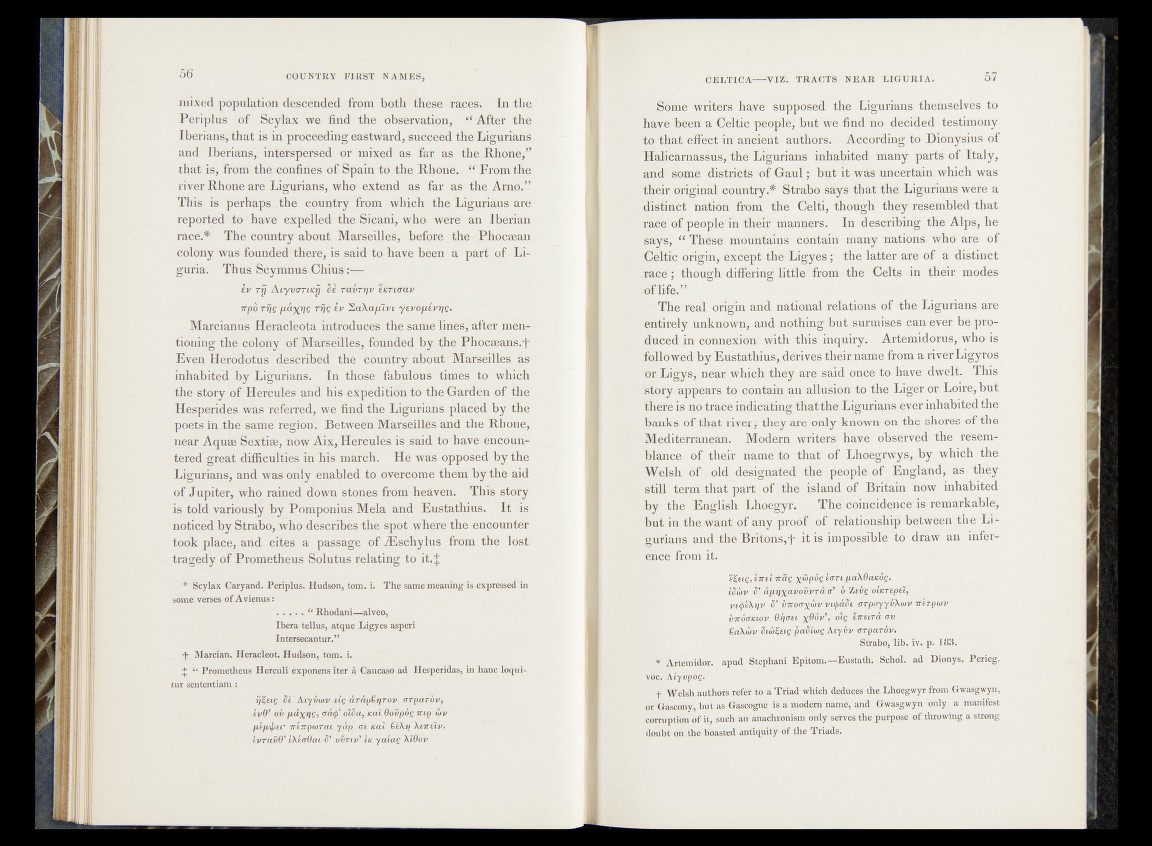
mixed population deseënded from both these races. In th%
Periplus of Scylax we find the observation, " “ After the
Iberians, that is in proceeding eastward, succeed the Ligurians
and Iberians, interspersed or mixed as far as the Rhone,”
that is, from the confines of Spain to the Rhone. “ From the
river Rhone arc Ligurians, who extend as far as the Arno.’’
This is perhaps the country from which the Ligurians are
reported to have expelled the Sicani, who were an Iberian
race.* The country about Marseilles, before the Phocæan
colony was founded there, is said to have been a part of Liguria.
Thus Seymnus Chius pÉl
£V rij AiyvoTiicij de Tavrrjv ’itc r ia a v
7fpo rrje fiàj(T)ç Trie t v 2 a X a fiïv i yevofxévrjç.
Mafcianus Heracleota introduces the same opes, after men--
tioning the colony of Marseilles, founded by the Phocæans.f
Even Herodotus described1 the country about Ma?sMlles jas
inhabited by Ligurians. In those fabulous times'1 to which
the story of Hercules and his expedition to the G ardenW tlie
Hesperides was referred, we find thè.'Ligurians placed by the
poets in the same region. Between Marseilles and the Rhone,
near Aquae Sextiae, now Aix, Herculès is said'to have encbuiM
tered great difficulties in his march. He was opposed by the':
Ligurians, and was only enabled to overcome them by the aid
of Jupiter, who rained down stones from Leaven. This story
is told variously by Pomponius Mela and Eustathius. It is
noticed by Strabo, who describes the spot where the encounter,
took place, and cites a passage of Æschylus from the lost
tragedy of Prometheus Solutus relating to it. J
* Seylax Caryand. Periplus. Hudson, tom. L The same meaning is expressed in
some verses of Avienus:
V . . . . “ Rhodani—alveo,
Ibera tellus, atque Ligyes asperi
Intersecantur.”
T Marcian. Heracleot. Hudson, tom. L'
£ “ Prometheus Herculi exponens iter â Caucaso ad Hesperidas, inhanc loquitur
sententiam :
8k .Aiyviov tie àrâptriTov, ffTparbv, ■
IvQ’ oi> aâ<j>’ ailSa, teal Oovpoç irep <ov
ukfvtytr irsirpioTai .y«p a t iea.1 €k\n \iirtXv-
èvTavO’ è\éà@ai 5’ ovriv’ Ik yalaç X'iaov
Some writers have supposed the Ligurians themselves to
have been a-Celtic^people, but we find no decided testimony
to- that eiicfe in ancient''authors. >:*According to Dionysius of
Halicarnassus, the Ligurians inhabited many parts of Italy,
and some districts p f G a u l; but it was uncertain which was
their original.country.* Strabo-says that the Ligurians were a
distinct nation ftMri the Celti, though5 they resembled that
race'dispeople'in thehy*fnaimer-s'. In d escribing the Alps, he
says, “ These mountains^;contain many nations who are of
Celtic origin, -except t<hevLi||yfes; th e latter'are-of a distinct
.race ; though differing little' fro'm thef.Celts in their modes
of life.”
“The real origin and national relations of 4hp'Ligurians are
entirely* unkno'wn, and nothinfe^ut sUrnal^Sf can everbe prof
^duCed' incomiexidnf yith this inquiry; ;,*•* Artemidorus^;who is
followed by Eustathius-,,derives their naj^e' from a ri^erLigyros
orpLigys, near which;th;ey are^s^id^onOte to havej This
appears-to-,contain an alfe^o^ftQ the Liger or Loily,but
no .traceindicating that the L i gujians ||j|3pinh abi tcdfhb
banks|@f thatvjaver; they.-are only Bndwnr on thef shores of th<|
^Mediterranean.- Moderniwriters havfeaobserved' the'resejfi^
bla-nGes?: of'-tfee'ir name-dro, that of Lhoegrwy s*vLy1 which" the
Welsh/'of old designafed' the^peopldl^f lEuglandylgs they
'still terih"that part of the island of Britain now inhabited
b p till English Lhoegf£r';;.k The-coincidence^rerhaTkable?,
but in the want of any probf of relationship* b & ^ n l» ! Li-
guriari§, and the Britons,f i t is, imposslBlmo draw an inference
from
sgeie', eirtl TracLx0P$%&tt paXOaKigc"
a/jit^cu/S«‘'o1’ 6 Zsiig ot£r|g£i,*>’ 5
vtty&iriv- o’ yeftafii: axpjSy^K&v ittTpwvv
r r6 aK io v Qr)aei i
€a\8)v Aty^vv 'arp arpie^ )
Strabo; lib. iv. p. 183.
* Ajrtemidor. apud Stephani Eptom.—EustatH. .Sohol. ad Dioriys. Perieg.
J.vbcV ’Aiyv0>£> ’ ‘
B L "Welsli authors refer to a Triad which deduces ’jljBe Lhoegwyr from Gwasgwyn,
or Gascon^ hut as Gascogne iVa modern nahie^a^dh'Gwasgwyh oftly- a manifest
Corruption: of it, such ari anachronism oiily' selves the purpose o f throwing a strong
doubt dn^the boasted antiquity of the Triads. s